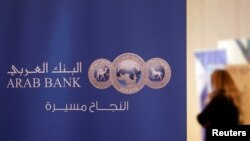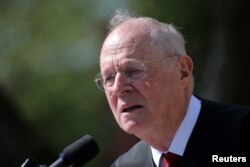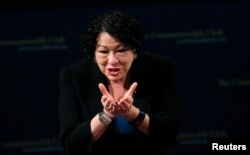The U.S. Supreme Court on Tuesday ruled that foreign corporations cannot be sued in American courts for human rights abuses overseas, refusing to revive a lawsuit claiming Jordan-based Arab Bank Plc helped finance militant attacks in Israel and the Palestinian territories.
The 5-4 decision brought to an end a lawsuit brought by some 6,000 non-U.S. citizen plaintiffs, including survivors and relatives of people killed in attacks, filed under a 1789 U.S. law called the Alien Tort Statute that accused Arab Bank of being the "paymaster" to militant groups.
The court ruled along ideological lines, with its five conservatives in the majority and its four liberal justices dissenting.
Conservative Justice Anthony Kennedy, writing for the court, said the "relatively minor connection between the terrorist attacks at issue in this case and the alleged conduct in the United States" illustrates the problems of extending liability to foreign corporations.
In ruling for the bank, the court for the second time in five years curbed the ability of plaintiffs to sue corporations in U.S. courts under the Alien Tort Statute for human rights violations occurring abroad. Other foreign-based companies to have faced such suits include Royal Dutch Shell PLC, Nestle SA and Daimler AG.
"Arab Bank is pleased with the court's decision, which ends this litigation and affirms the bank's belief that there is no basis to hold corporations liable under international law," the bank said in a statement.
Lawyers for the plaintiffs could not immediately be reached for comment.
The ruling delivered a blow to human rights lawyers but left open the possibility of U.S. corporations being sued under the Alien Tort Statute in limited circumstances.
Paul Hoffman, who represents plaintiffs in such disputes, said a current case in which Indonesian villagers sued U.S.-based Exxon Mobil Corp for alleged human rights abuses carried out by security forces working for the company should be unaffected by Tuesday's ruling.
Hoffman said Kennedy "went out of his way to avoid a categorical ruling" shielding U.S. corporations.
Suicide bombings
The plaintiffs accused Arab Bank of deliberately financing terrorism, including suicide bombings and other attacks. They said Arab Bank used its New York branch to transfer money that helped Hamas and other Islamist militant groups fund attacks and reward families of perpetrators between 1995 and 2005.
Noting that the case has caused significant diplomatic tension with Jordan, a U.S. ally, Kennedy said the "political branches are in a better position" to extend that liability if they so choose.
Liberal Justice Sonia Sotomayor wrote in a dissent that barring suits against foreign companies ensures they "remain immune from liability for human rights abuses, however egregious they may be."
The lead plaintiff in the Arab Bank case was Joseph Jesner, whose British citizen son was killed at age 19 in a 2002 suicide bombing of a bus in Tel Aviv. The bank said in court papers the U.S. government has called it a constructive partner in the fight against terrorism financing.
In its previous 2013 ruling, the Supreme Court did not resolve the corporate liability question when it ruled in favor of Shell over a lawsuit claiming the company was complicit in a crackdown on protesters in Nigeria.
That 2013 ruling narrowed the Alien Tort Statute's reach, saying claims must sufficiently "touch and concern" the United States to overcome the presumption that the law does not cover foreign conduct.
In a separate case involving U.S. citizens that was brought under a different law, a New York jury in 2014 found Arab Bank liable for facilitating two dozen militant attacks in Israel.
That ruling was overturned on appeal in January.











